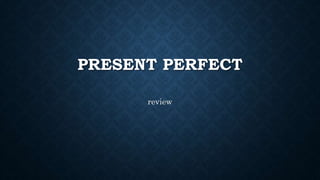
Present perfect
- 2. PRESENTE PERFECT FORM The present perfect form of any verb is composed of two elements : To have + Past Participle (PP) Base form Simple Past Past Participle study studied studied wake up woke up woken up speak spoke spoken
- 3. STRUCTURE • He/she/it + has + pp • We/you/they + have + pp • Affirmative • Subject+ to have + pp • (+) The government has applied new rules that affect our economy. • Negative • Subject+ to have+ not +pp • (-) The government hasn’t applied new rules that affect our economy. Interrogative • (y/n) has The government applied new rules that affect our economy.?
- 4. TIME LINE OF PRESENT PERFECT We use the Present Perfect for actions in the past which have a connection to the present. The time when these actions happened is not important. We use the Present Perfect for recently completed actions. We use the Present Perfect for actions beginning in the past and still continuing.
- 5. USAGE • The present perfect is used to express a link between the present and the past,The time of the action is before now but not specified and we are more often interested in the result than the action itself. • Action or situation that started in the past and continues in the present or even future. I They have lived in London since 1984. (and still do). He has worked in the bank for five years. • An action performed during a period of time that has not finished yet. She has been to the cinema twice. (the week is not finished yet) I have worked hard this week. We haven’t seen her today.
- 6. USAGE . A repeated action in an unspecified period between past and and now. We have visited Portugal several times. They have seen that film several times We have visited them several times already. • An action when the time is not important. • He has read the novel “War and Peace”. (The result of his reading is important)
- 7. USAGE • An action that was completed in the very recent past (just) I have just finished my work, We have just eaten. When the precise time of the action is not important. Someone has stolen my watch.
- 8. PRESENT PERFECT+EVER, NEVER, ALREADY, YET • The adverbs ever and never express the idea of an unidentified time before now. • Ever is used in questions. • Have you ever been to England? • Has she ever met the Prime minister? In negative questions • Haven’t you ever been to Europe. • Haven’t you ever eaten Chinese food. • Ever is used in negative statements using the pattern nothing ….ever, nobody ….ever. Eg. Nobody has ever said that to me before. Nothing like this has ever happened to us.
- 9. TIME EXPRESIONS • just • yet • never • already • ever • so far • up to now • recently • since • for
- 10. PRESENT PERFECT+EVER, NEVER, ALREADY, YET • Never means at no time before now, and is the same as not …ever. • I have never visited Berlin. • WE MUST NOT USE NEVER AND NOT TOGETHER. • I have not never been to Italy • I have never been to Italy
- 11. ALREADY AND YET • Already refers to an action that has happened at an unspecified time , untit now. It suggest that there is no need for repetition, e.g. I have already drunk three cups of coffee this morning (and you are offering me another one) Don’t write to John , I’ve already done it. I have been to Tokyo already. YET It is used in negative statements and questions to mean (not) Have you met Judy yet? They haven’t eaten yet.
- 12. THE MOST COMMON QUESTIONS WITH PRESENT PERFECT 1. Yes/No questions • IN YOUR LIFE. • Have you ever been/seen/received ? • Have you been there before • Have we met before. • 2.- RECENT SIGHTINGS • Have you seen my phone/Jim • Has anyone seen my • 3. RECOMMENDATIONS. • Have you thought about..? (Nor going there) • Have you considered..? • 4. CONDITIONAL • Have you ever thought about/considered What ould happen if we discovered life on other planet
- 13. THE MOST COMMON QUESTIONS WITH PRESENT PERFECT WITH W QUESTIONS. Where have you been? How have you been? What have you done? How long have you been there? Why has no one ever mentioned before?
- 14. EXERCISES • That boy …….(break )a window. • That boy have broken a window • I …(know )her for a long time. • I have known her for a long time • He ………(just eat) a sandwich. • He has just eaten a sandwich • She ……….(never/be) to London. • She has never been to London. • ………. You ……….(ever/see) a lion ? • Have you ever seen a lion? • I ……….(not/finish) my homework yet. • I haven’t finished my homework yet • She ……….(have) that laptop for 2 years. • She has had that laptop for 2 years.
- 15. The end